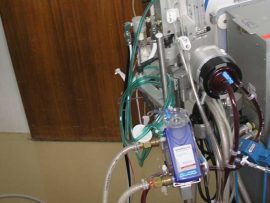Abstract There are minimal data on the use of venoarterial extracorporeal membrane life support (VA-ECLS) in adult congenital heart disease (ACHD) patients presenting with cardiogenic shock (CS). This study sought..
Read MorePrognosis of Venoarterial Extracorporeal Membrane Oxygenation in Mixed, Cardiogenic and Septic Shock
Abstract Mixed cardiogenic-septic shock (MS), defined as the combination of cardiogenic (CS) and septic (SS) shock, is often encountered in cardiac intensive care units. Herein, the authors compared the impact of..
Read MoreAbstract Background The mortality rate for a patient with a refractory cardiogenic shock on venoarterial (VA) extracorporeal membrane oxygenation (ECMO) remains high, and hyperoxia might worsen this prognosis. The objective..
Read MoreAbstract Background: Exposure to hyperoxia, a high arterial partial pressure of oxygen (PaO2), may be associated with worse outcomes in patients receiving extracorporeal membrane oxygenator (ECMO) support. We examined hyperoxia in..
Read MoreAbstract Purpose: Veno‑arterial (VA) extracorporeal membrane oxygenation (ECMO) can be used to restore organ perfusionin patients with cardiogenic shock until native heart recovery occurs. It may be challenging, however, to..
Read MoreAbstract Aims Venoarterial extracorporeal membrane oxygenation (VA-ECMO) is currently one of the most used devices in refractory cardiogenic shock. However, there is a lack of evidence on how to set..
Read MoreAbstract The time between onset of cardiogenic shock and initiation of mechanical circulatory support is inversely related to patient survival as delays in transporting patients to the operating room (OR)..
Read MoreAbstract In patients in cardiogenic shock (CS), mechanical circulatory support (MCS) may improve systemic perfusion without increasing myocardial work. Restoration of oxygen delivery with reduced myocardial oxygen demand favors myocardial..
Read MoreAbstract Background: Veno-arterial extracorporeal membrane oxygenation (VA-ECMO) is increasingly being used for circulatory support in cardiogenic shock patients, although the evidence supporting its use in this context remains insufficient. The aim..
Read MoreAbstract Background and purpose Extracorporeal membrane oxygenation (ECMO) continues to play an essential role in organ support in cardiogenic shock or acute respiratory distress syndrome and bridging to transplantation. The..
Read MoreAbstract The recent widespread availability and use of mechanical circulatory support is transforming the management and outcomes of cardiogenic shock (CS). Clinical decision-making regarding the optimization of therapies for patients with..
Read MoreAbstract Background Shock severity predicts mortality in patients with cardiogenic shock (CS). We evaluated the association between pre-cannulation Society for Cardiovascular Angiography and Interventions (SCAI) shock classification and mortality among..
Read MoreAbstract Background: The mortality rate for a patient with a refractory cardiogenic shock on venoarterial (VA) extracorporealmembrane oxygenation (ECMO) remains high, and hyperoxia might worsen this prognosis. The objective of..
Read MoreAbstract Selecting patients most likely to benefit from venoarterial extracorporeal membrane oxygenation (V-A ECMO) to treat refractory drug-induced cardiovascular shock remains a difficult challenge for physicians. This study reported short-term..
Read MoreAbstract Venoarterial extracorporeal membrane oxygenation (V-A ECMO) is increasingly used in cardiogenic shock for rapid stabilization and bridging towards recovery, long-term mechanical circulatory support or transplant. Although technological advances have..
Read MoreAbstract The use of temporary mechanical circulatory support in cardiogenic shock has increased dramatically despite a lack of randomized controlled trials or evidence guiding clinical decision-making. Recommendations from professional societies..
Read MoreAbstract Purpose of review Cardiogenic shock is a condition that is characterized by end-organ hypoperfusion secondary to reduced cardiac output, and is associated with substantial mortality. The mainstay of therapy..
Read MoreAbstract Purpose Venoarterial (VA ECMO) effectively supports refractory (rCS), and sustains macro- and . We investigated the respective impact of increasing VA ECMO flow or dose on microcirculation in stabilized VA ECMO–treated patients with..
Read MoreAbstract The use of venoarterial extracorporeal membrane oxygenation (VA-ECMO) following acute myocardial infarction with cardiogenic shock (AMI-CS) is increasing, but the ability to predict favorable outcomes with support remains limited...
Read MoreAbstract Although mechanical circulatory support (MCS) has been used to support patients with cardiogenic shock (CS) for many years, recent advances in device technology, together with the lackluster performance of..
Read MoreAbstract Aims Intracranial haemorrhage (ICH) is one of the most serious complications of adult patients treated with venoarterial extracorporeal membrane oxygenation (VA-ECMO) and is associated with increased morbidity and mortality...
Read MoreAbstract Background: Vasoplegic syndrome is associated with increased morbidity and mortality in patients undergoing cardiac surgery. This retrospective, single-center study aimed to evaluate the effect of early use of methylene..
Read MoreAbstract Background Venoarterial extracorporeal membrane oxygenation (V-A ECMO) with femoral access has gained wide acceptance in the treatment of critically ill patients. Since the patient´s cardiac output (CO) can compete..
Read MoreAbstract Background Patients with cardiogenic shock or cardiac arrest undergoing venoarterial extracorporeal membrane oxygenation (V-A ECMO) frequently present with blood glucose levels out of normal range. The clinical relevance of..
Read MoreAbstract Aims Venoarterial extracorporeal membrane oxygenation (VA-ECMO) is increasingly being used to support patients in cardiogenic shock (CS). Early determination of disposition is paramount, as longer durations of support have..
Read MoreAbstract Background: Initiation of veno-arterial (VA) Extracorporeal Membrane Oxygenator (ECMO) is associated with severe complications. It is unknown whether these adverse consequences occur more often after initiations during out of..
Read MoreAbstract Background and Objectives: Cardiogenic shock (CS) is a medical emergency associated with a high mortality rate. Veno-arterial extracorporeal membrane oxygenation (VA-ECMO) has become an accepted therapy for CS. Despite..
Read MoreAbstract Objectives To compare the outcomes of patients with postcardiotomy shock treated with venoarterial (VA-ECMO) only compared with VA-ECMO and intra-aortic balloon pump (IABP). Design A retrospective multicenter registry study. Setting..
Read MoreAbstract Importance The optimal approach to the use of venoarterial extracorporeal membrane oxygenation (ECMO) during cardiogenic shock is uncertain. Objective To determine whether early use of moderate hypothermia (33-34 °C) compared with..
Read MoreAbstract The Impella mechanical circulatory support (MCS) system is a catheter-based continuous flow cardiac assist device that is widely used in the treatment of cardiogenic shock in medical and surgical cardiac intensive..
Read More
















